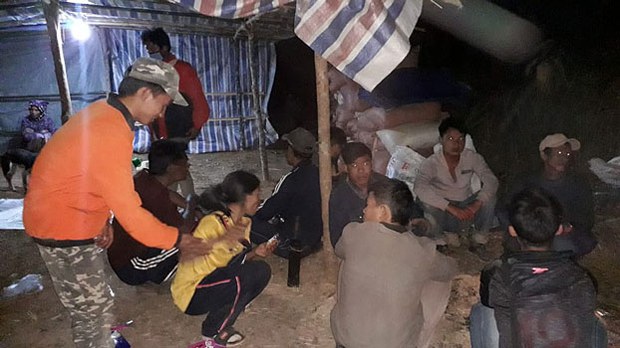Five Lao Christian families evicted from their villages by local authorities are still waiting for new homes promised to them by higher government officials, who have ordered that new homes be built for them to replace the old ones demolished when they left, Lao sources say.
The 21 residents of Pasing-Kang village and Pateum village in the Ta-Oey district of Saravan province in southern Laos were evicted last year and early this year for refusing to renounce their faith, with one group then living rough for a time in the forest, but were later allowed to return.
All are still homeless, said one of the 14 Christian villagers evicted from Pateum on Jan. 31, 2021, speaking to RFA’s Lao Service this week.
“My family and I are still living in small huts in our rice field near the forest. We’re still homeless,” the villager said, speaking like other sources on condition of anonymity for reasons of security.
“According to the agreement allowing us to return, the village authorities are supposed to build us a new home, but they haven’t done anything they’re supposed to do,” he said. “The village authorities now say they have to wait for the district authorities to take action.”
A member of the Ta-Oey district’s Evangelical Church told RFA that church members have spoken to village authorities about building new homes for the five returned families. “But they told us to go talk to the district authorities instead,” he said.
“So we went and talked to the district, but they told us to go back and talk to the village chief. We also went to provincial headquarters, and they said to go back to the district and the villages. It’s going nowhere.”
“Authorities at all levels are just ignoring this problem and have no intention of helping these Christians at all. So they just have to continue to wait for their new homes to be built,” he said.
“According to the agreement, the village authorities have to build new homes for the Christians, but they wouldn’t do that,” another church member in the province confirmed. “Nobody is doing anything, so those Christians remain homeless.”
Another Christian in southern Laos said that authorities often demand that they renounce their Christian faith.
“Those who renounce their faith will be left alone, but those who refuse will have to leave their villages, and their homes will be destroyed. That was the reason for these evictions,” he said. “The authorities just hate God.”
Speaking to RFA earlier this month, a Ta-Oey district official said the district won’t build new homes for the Christians on its own. “But we will push the villages to do so. We will monitor them closely, and we won’t allow [the Christians] to be harassed again.”
Seven Christians from two families evicted on Oct. 10, 2020 from Pasing-Kang village are also waiting for new homes to be built after they were allowed to return after a month spent living in huts in the forest near their fields, sources said.
The group had also refused to renounce their faith, and local authorities had torn down their homes after expelling them from the village.
Lao Christians are allowed by the country’s Law on the Evangelical Church, approved and signed in Laos on Dec. 19, 2019, to conduct services and preach throughout the country and to maintain contacts with believers in other countries.
But in practice, the law appears to apply only in the capital Vientiane and in other large cities, while Christians in the rural areas remain subject to disrespect by the general public and discrimination at the hands of local authorities, sources say.
Though improvements in religious freedom conditions were observed in Laos in 2019, cases of abuse were still seen in remote rural areas, the bipartisan U.S. Commission on International Religious Freedom (USCIRF) said in a report released in May 2020.
Copyright © 1998-2020, RFA. Used with the permission of Radio Free Asia, 2025 M St. NW, Suite 300, Washington DC 20036.







